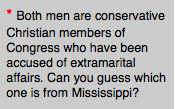
I think this picture is what's been missing from our increasingly tedious Friday visual puns, if you know what I mean.
It’s the end of the week, and TGIFF, you B’s. Maybe it’s just the unseasonably warm weather here in Montana, but I can’t help but feel that a veil is falling away. Ours is an impressively euphemistic society, where bitter spite goes dressed in the robes of parliamentary procedure and cold depredation smiles warmly from the podium. Unlike a lie, though, the truth is there whether you’re talking about it or not, and like the gay director of your church camp, it will eventually out itself. This week was a surprisingly good one for calling things by their right names, to the point that even our usually gloomy Friday links have taken on the rosy glow of…god, I can’t think of the word. What’s that thing that’s the opposite of despair? You know, the thing that rich charlatans laugh at? I know it’s a political strategy of some sort, but I feel like it has an archaic definition, too. Ah, well—I’m sure I’ll think of it, and if I never do I’ll still have consumer electronics. In the meantime, enjoy this week’s link roundup, in which a mighty herd of telling it like it is goes sweeping across the nation, paradoxically leaving a little less bullshit in its wake.
Much like the Huffington Post, Talking Points Memo is good primarily for making me feel like I might be similar to those I claim to hate. Relentless partisan scorekeeping has its place, though, and this week the nakedly biased new media has fulfilled the function abdicated by an ostensibly responsible press. TPM provides us with this handy list of six Republican senators who voted against cloture on the President’s jobs bill, but then voted in favor of the actual piece of legislation itself. Mad props to Jacek for the link. For those of you who did not spend the last few years explaining the workings of American government to extremely bored preparatory school students, cloture is the act of concluding debate on a bill and putting it to a general vote. Blocking cloture is a procedural move similar to the filibuster, and is generally employed as a means of stopping a bill that is likely to pass but you vehemently oppose. The votes of these six senators—against cloture but in favor of the bill that their blockage to cloture would have killed, had it been successful—suggests that they are not opposed to this piece of legislation in particular so much as to the passage of legislation generally. Far be it from me to suggest that the half-dozen Republicans so vehemently opposed to tax breaks for businesses hiring former recipients of unemployment are placing politics ahead of the good of the nation. If they hate passing laws so much, though, one is forced to question why they became congressmen in the first place. Maybe they would like to try something new.
That’s what Evan Bayh decided to do, to the great consternation of Democrats everywhere who give a rat’s ass about Evan Bayh. Personally, I’m saving my last couple of rat’s asses for the Olympics. One fewer D vote won’t make the difference between a filibuster-proof majority and a really good majority anyway, and in the present senatorial atmosphere, really good isn’t good enough. In his guest column in the New York Times, Bayh attributes the problems with the body to an atmosphere of personal acrimony. He compares the brutal partisanship of today’s Senate to the collegial attitude enjoyed by his father, Birch Bayh, who A) just sounds old as shit and B) served in the Senate for twenty years. First of all, the United States government should pass a law that no person can occupy an office at one time occupied by a member of his immediate family. Second, Bayh describes a bygone era of dinners, talkbacks and other social events that forced Senators to behave as if they were, you know, peers. Bayh acknowledges the danger of romanticizing the history of the Senate—the Sumner-Brooks Affair leaps to mind—but it’s hard not to think that something essential has been lost. It’s hard to enjoy your roasted game hen when you’re sitting across from someone you’ve just accused of participating in a socialist plot. Perhaps the force of social awkwardness can return our elected representatives to something resembling cooperation.
Then again, maybe the last thing we need is for Congress to more closely resemble a fraternity. A group of ministers in Ohio have questioned the tax-exempt status of a townhouse near Capitol Hill that provides housing for several conservative Christian members of Congress. Known as the C Street Center, the building has housed such luminaries as congressmen John Ensign and Charles W. Pickering, Jr.* and is currently classified as a church, despite not being open to the public, not holding regular religious services, and having no ecclesiastical structure. The C Street Center is affiliated with The Family, the mysterious and weird Christian organization dedicated to ministering to the most powerful members of society and last seen convincing Uganda to round up homosexuals and murder them. It’s a sin to speak for Jesus, but I’m pretty sure he would love that. “We are concerned that an exclusive residential club for powerful officials may be masquerading as a church,” 13 protestant ministers said in a letter to the IRS. You and me both, 13 Protestant ministers. Pigs get fed, Family, and hogs get slaughtered. At least put a cross on top of your $1.8 million townhouse.
and is currently classified as a church, despite not being open to the public, not holding regular religious services, and having no ecclesiastical structure. The C Street Center is affiliated with The Family, the mysterious and weird Christian organization dedicated to ministering to the most powerful members of society and last seen convincing Uganda to round up homosexuals and murder them. It’s a sin to speak for Jesus, but I’m pretty sure he would love that. “We are concerned that an exclusive residential club for powerful officials may be masquerading as a church,” 13 protestant ministers said in a letter to the IRS. You and me both, 13 Protestant ministers. Pigs get fed, Family, and hogs get slaughtered. At least put a cross on top of your $1.8 million townhouse.
It’s not like you need tax-exempt status to not pay taxes, anyway. Those of you who believe that the rich in this country shoulder an unfair portion of our national tax burden should consider the case of Frank and Jamie McCourt, who made $108 million between 2004 and 2009 but paid no state or federal income taxes. The couple doesn’t seem to have done anything illegal; all of the tax money they would have owed was offset by deductions from assessed depreciation of their enormous real estate holdings, which means that during the last five years they have ostensibly made no money. Depending on which divorce attorney you believe, either Frank and Jamie own the Los Angeles Dodgers or just Frank does, and they also have eight houses, which suggests that they made more money than I did last year. Jamie’s lawyer pretty much agrees, saying that the deductions the McCourts claimed were “tax losses, not real losses.” Are you angry yet? As Michael Hiltzik points out, the American tax code is structured in such a way as to make it much easier to legally avoid paying taxes on investment income than on wages. In other words, the people who don’t work for their money are much less likely to have to give some of it back. It’s weird that neither Evan Bayh nor his dad nor George Bush nor his dad ever got around to doing something about that.
There are other ways to redistribute wealth, though. Last week, some gentlemen in Holland launched Please Rob Me, a website that gathers data from social networking sites like Twitter and Foursquare to announce when people aren’t home. Please Rob Me does not provide the addresses of actual homes, and was apparently founded in order to bring attention to certain scary privacy issues posed by the old internets. It also brings attention to the sheer narcissism of Foursquare, which puts Twitter in perspective by allowing douchebags to announce to the world that they have arrived at work. Check it out, if only to see a list of people who want you to know their location at all times.



